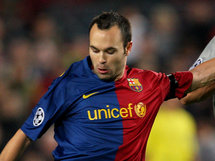
As the South African hosts gave themselves a pat on the back for defying pessimistic predictions, the victors savoured the latest chapter in a fairytale of sporting successes.
The squad headed back to Madrid where more than a million fans were expected to line the streets of the capital Madrid for a victory parade on a open top bus.
But the party began immediately after Barcelona's Andres Iniesta scored the final's only goal, three minutes before the end of extra time after a match watched by an estimated 700 million people worldwide.
"Iniesta Presidente! Iniesta Presidente!" chanted one group of fans as they marched along the centre of the Gran Via, Madrid's main thoroughfare in the early hours.
Others imitated bullfighters and waved Spanish flags over passing cars while chanting "Ole!" to celebrate Spain's first win World Cup triumph.
Prime Minister Jose Luis Rodriguez Zapatero, who will host a reception for the team, said he had "suffered like never before" as he watched the game in Johannesburg's Soccer City staudium.
The victory came exactly a week after the Spaniard Rafael Nadal lifted the Wimbledon tennis trophy and caps a series of major sporting achievements, including a European title for the nation's basketball team.
The victories have brought a sliver of joy to a country with here around 20 percent of the active population is unemployed and the economy is forecast to contract by 0.3 percent over 2010 as a whole.
While Zapatero's administration is keeping its fingers crossed that the feel-good factor will linger, the South African government is also hoping the tournament will bring long-term benefits.
Ever since it became the first African nation to win the right to stage the world's biggest sporting event, South Africa has had to fend off accusations that rampant crime and lack of infrastructure made it an unsuitable choice.
The squad headed back to Madrid where more than a million fans were expected to line the streets of the capital Madrid for a victory parade on a open top bus.
But the party began immediately after Barcelona's Andres Iniesta scored the final's only goal, three minutes before the end of extra time after a match watched by an estimated 700 million people worldwide.
"Iniesta Presidente! Iniesta Presidente!" chanted one group of fans as they marched along the centre of the Gran Via, Madrid's main thoroughfare in the early hours.
Others imitated bullfighters and waved Spanish flags over passing cars while chanting "Ole!" to celebrate Spain's first win World Cup triumph.
Prime Minister Jose Luis Rodriguez Zapatero, who will host a reception for the team, said he had "suffered like never before" as he watched the game in Johannesburg's Soccer City staudium.
The victory came exactly a week after the Spaniard Rafael Nadal lifted the Wimbledon tennis trophy and caps a series of major sporting achievements, including a European title for the nation's basketball team.
The victories have brought a sliver of joy to a country with here around 20 percent of the active population is unemployed and the economy is forecast to contract by 0.3 percent over 2010 as a whole.
While Zapatero's administration is keeping its fingers crossed that the feel-good factor will linger, the South African government is also hoping the tournament will bring long-term benefits.
Ever since it became the first African nation to win the right to stage the world's biggest sporting event, South Africa has had to fend off accusations that rampant crime and lack of infrastructure made it an unsuitable choice.









 Home
Home Politics
Politics









